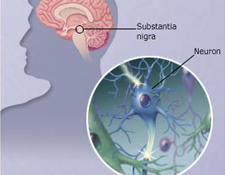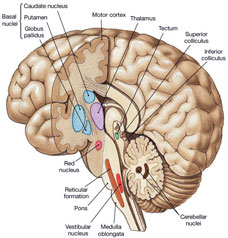|
Few reliable data are available
on the global prevalence of Parkinson's disease, but it is
estimated that 4 million people are suffering from the disease
world-wide. Parkinson's disease affects all ethnic groups.
Although Parkinson's disease occurs in every part of the world,
because it is mainly an illness of later life, it is more common
in developed countries where people live longer. The overall
prevalence of Parkinson's disease in Europe is approximately 1.6 –
1.8 per 100 in persons over 65 years of age. Because of the ageing
of the world population, the importance of Parkinson's disease as
a public health issue is expected to increase.
What is Parkinson's Disease?
Parkinson's disease, also known as PD or Parkinson's for short, is
a chronic, progressive disorder of the central nervous system that
affects various parts of the body, causing:
Tremor (uncontrolled shaking, usually in the hands or feet and
when the muscles are relaxed)
Stiffness in the muscles
Slowness
Difficulty when starting movements
The disease is named after a London doctor, James Parkinson, who
first recognised its main features, particularly the
characteristic uncontrolled shaking of the limbs. His Essay on
"The Shaking Palsy", written in 1817, provided the basis for all
later research.
The cause of Parkinson's disease is unknown. What is known is that
it results from a deficiency of the chemical messenger
(neurotransmitter) dopamine, which is produced by the brain and
plays a vital role in the control of voluntary movement.
In Parkinson's disease, dopamine-producing cells are lost from the
brain, causing a shortage of dopamine. The clinical symptoms of
Parkinson's disease occur when there is not enough dopamine in the
brain to generate this signal for movement control.
Which parts of the body are affected, and how badly, differs among
individuals. Although the symptoms tend to get worse as time goes
on, this usually happens very slowly. Meanwhile, treatment for
symptoms is available, and there is a lot that can be done to
minimise any problems.
Management of Parkinson's Disease
Since the symptoms of Parkinson's disease are due to a shortage of
dopamine in the brain, the main aim of drug therapy is to replace
or augment the supply of this chemical. The use of levodopa, which
is converted into dopamine in the brain, revolutionised the
treatment of Parkinson's disease. The advantage of levodopa
treatment is that it controls the symptoms of Parkinson's disease
and most people can tolerate it.
|





